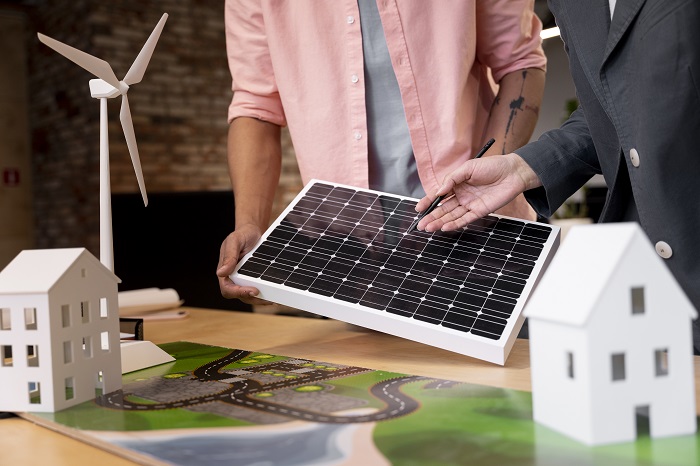Investing in solar panels is a significant decision that can lead to substantial savings on energy bills while contributing to environmental sustainability.
However, before diving into this investment, especially for a two story home, it’s essential to consider several factors.
This guide provides nine essential tips to help you make an informed decision before installing solar panels in Columbus or any other location.
Why Consider Solar Panels for Your Two Story Home?
Solar energy is an increasingly popular choice for homeowners looking to reduce their carbon footprint and lower electricity costs. Two story homes, with their larger roof space, are particularly well-suited for solar panel installations.
However, the process involves more than just purchasing panels and having them installed. Understanding the specifics of your home, local regulations, and potential savings is crucial for a successful transition to solar power.
1. Evaluate Your Home’s Energy Consumption
Before deciding to invest in solar panels, it is crucial to thoroughly evaluate your current energy consumption patterns. Take the time to meticulously analyze your electricity bills spanning the past year to gain insight into how much energy you typically use.
This detailed examination will provide you with a comprehensive understanding of your consumption habits, empowering you to accurately determine the optimal size and quantity of solar panels required for your two-story residence.
Remember, a higher level of energy consumption will necessitate the installation of a larger solar panel system to ensure it adequately meets your household’s energy needs.
2. Assess Your Roof’s Suitability
The roof of your two story home plays a critical role in the efficiency of your solar panels. Consider the following aspects:
Orientation and Angle
South-facing roofs with a tilt angle equal to your latitude provide optimal conditions for solar panels. However, east and west-facing roofs can also be suitable with a slight decrease in efficiency. North-facing roofs are not recommended.
Roof Material
The material of your roof is another component to consider. Solar panels may installed on most roofing materials, including asphalt shingles, metal, tile, and flat roofs. However, some materials such as cedar shake or slate may require additional support for the installation.
Shading
Shade from trees or buildings can significantly impact the performance of your solar panels. It is important to assess the amount and timing of shading on your roof to determine the best placement for maximum sunlight exposure.
Roof Age and Condition
It’s crucial to evaluate the roof condition and age of your roof before installing solar panels. If your roof is older and in need of repairs or replacement, it may be wise to address those issues before adding solar panels.
This will ensure that your roof can support the weight of the panels and avoid any potential damage to both your roof and the solar system.
3. Understand Local Regulations and Incentives
Before installing solar panels in Columbus or any other city, it’s important to familiarize yourself with local regulations and incentives. Check with your city’s building department for any permits or zoning requirements.
Additionally, take advantage of federal, state, and local incentives, such as tax credits and rebates, which can significantly reduce the initial cost of your solar panel system.
4. Choose the Right Type of Solar Panels
There are several types of solar panels available, each with its advantages and disadvantages:
Monocrystalline
These panels are highly efficient and have a longer lifespan but are more expensive. They are ideal for small spaces and roofs with limited space.
Polycrystalline
These panels are less efficient but also less expensive than monocrystalline panels. They work best in areas with high solar irradiation levels.
Thin-Film
These panels are the cheapest option, but they require a larger installation area due to their lower efficiency. They can be installed on roofs or ground-mounted.
5. Consider the Installation Company’s Reputation
Selecting a reputable solar installation company is crucial for a successful installation. Look for companies with positive customer reviews, proper licensing, and certifications.
Request quotes from multiple installers to compare prices and services. A reputable company will provide a detailed proposal, including an estimate of your energy savings, the cost of the system, and the installation timeline.
6. Analyze the Financial Aspects
Investing in solar panels involves significant upfront costs, but the long-term savings can be substantial. Calculate the return on investment (ROI) by considering the following:
- initial cost
- incentives
- energy savings
- payback period
7. Explore Financing Options
If the upfront cost of solar panels is a concern, explore various financing options available. These include:
Solar Loans
Borrow the money to purchase the system and pay it back over time with interest. Look for low-interest loans with flexible repayment terms.
Leasing
Rent the solar panels from a company and pay a monthly fee. This option often requires little to no upfront costs, but you won’t own the system or receive any tax credits or incentives.
Power Purchase Agreements (PPA)
Agree with a solar provider to purchase the electricity generated by the system at a set rate over a specific period. This can be beneficial for those who cannot afford the upfront costs of purchasing a system.
8. Plan for Maintenance and Monitoring
While solar panels require minimal maintenance, regular monitoring ensures they operate at peak efficiency. Keep the panels clean and free from debris, and schedule annual inspections to check for any issues.
Some solar companies offer maintenance packages and monitoring services, which can provide peace of mind and help maximize your system’s performance.
9. Consider Future Energy Needs
When planning your solar panel installation, consider your future energy needs. If you plan to add electric vehicles, a home office, or other high-energy appliances, account for this in your solar panel system’s capacity. A larger system might be a better investment if you anticipate an increase in energy consumption in the coming years.
Make an Informed Decision for Your Two Story Home
Investing in solar panels for your two story home can bring you major financial and environmental perks. Just check your energy use, see if your roof is a good fit, know the local rules, pick the right panels, and think about the money side of things.
Putting up solar panels needs some planning, but with these nine key tips, you’ll be all set to go ahead with your solar panel investment for your two-story home.
For more tips, ideas, and inspirations for your life, visit the rest of our blog today!




